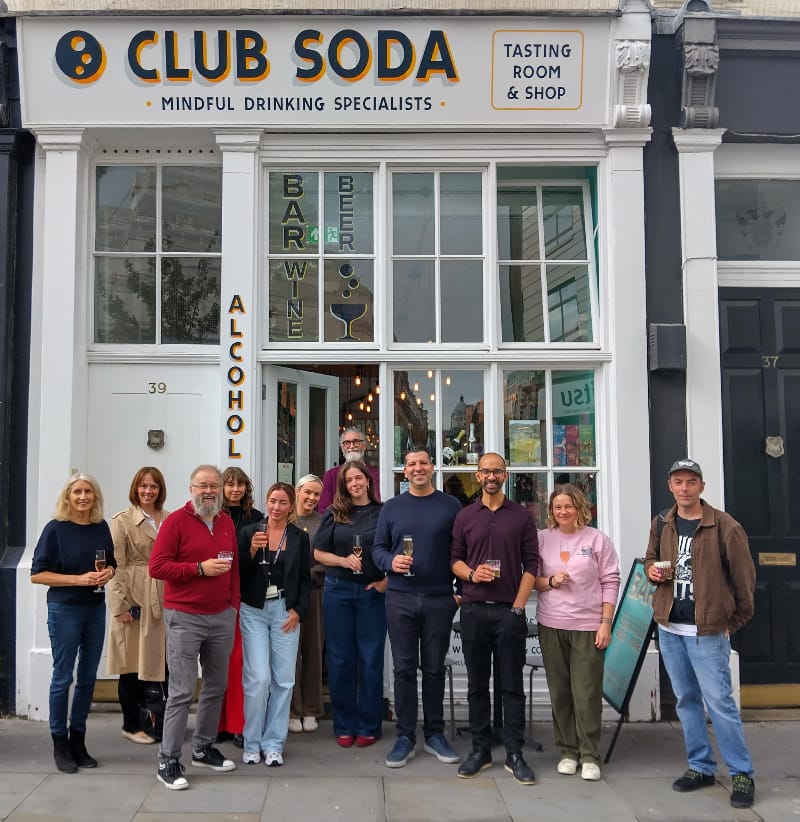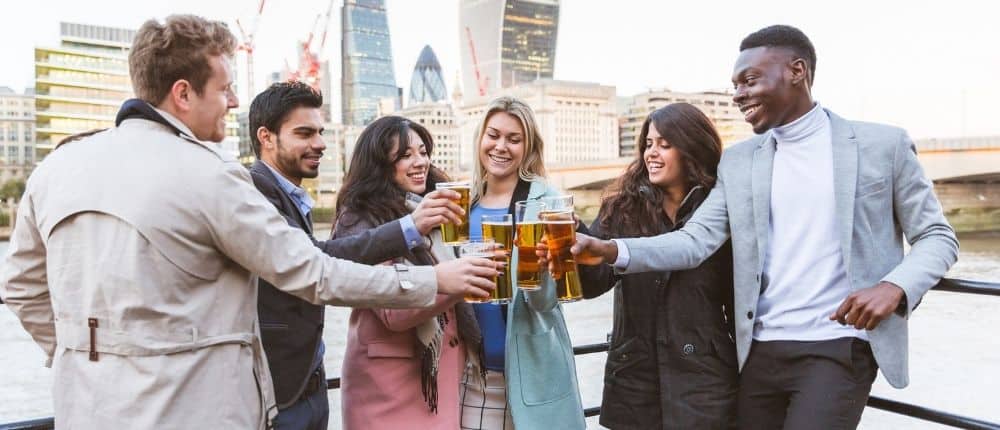
This website uses cookies to improve your experience. We'll assume you're ok with this, but you can opt-out if you wish. Read More
The Next Round: What happens after you change your drinking?


Alcohol gives me so much confidence, and my humour comes out so naturally. When I’m drunk, I’m so much more outgoing, confident and funny, and I don’t feel awkward at all. The only issue is I always take it past that level and get absolutely blackout drunk. If I stop drinking, will I go from being the life and soul of the party to someone who doesn’t stand out at all? Or can I drink without getting drunk? Tom

In Club Soda, we help people change their relationship with alcohol by cutting down, taking breaks and stopping for good. In our community and beyond, many people want to drink moderately. So you’re not alone in thinking about how to drink without getting drunk.
Of course, others in Club Soda decide not to drink, so it is worth saying this upfront. There are lots of outgoing, confident and funny people who never drink. And you can be the life and soul of the party without getting drunk. So don’t read anything in this article as an encouragement to drink alcohol. Use it to make informed and mindful decisions about what works for you.
If you do want to drink without getting drunk, there are a few issues to think through. This article explores what being drunk means, how much is too much, why some people never seem drunk, and how to find your sweet spot with alcohol.
Given humanity’s astonishingly long relationship with alcohol, it’s is remarkable that nobody has ever defined the word “drunk”.
Alcohol has been a part of human culture for a very long time. There’s evidence from the ruins at Göbekli Tepe in Turkey that our ancestors were using grains to make bread and beer around 12,000 years ago. And our physical ability to derive energy from alcohol goes back even further. 10 million years ago, in the time before we evolved into modern humans, our hominid ancestors developed the ability to metabolise ethanol. We started drinking before we became human.
We have endless ways of talking about being intoxicated by alcohol. And that suggests that there’s a spectrum of different experiences. At one end of the scale, we get merry, squiffy, tipsy and maybe a little sozzled. A few drinks too many, and we become sloshed, hammered, rat-arsed and trollied. Steaming even. Then we go too far and get wasted, wankered, slaughtered or even utterly gazeboed (to quote the comedian Michael McIntyre).
If you’re going to drink, how drunk do you want to be?
That scale of experiences of being drunk suggests that we should consider how much we want to drink. It’s worth saying that from the perspective of our physical health, that answer should be nothing. More and more research shows that any amount of alcohol has a damaging impact on our brains and bodies.
So if there’s no safe amount to drink, why do we drink anyway? As the World Health Organisation puts it, “alcohol is a toxic and psychoactive substance with dependence producing properties. In many of today’s societies, alcoholic beverages are a routine part of the social landscape for many in the population.” It’s fair to say that our collective relationship with alcohol is complicated.
If you’re going to drink, you’ll need to define “drunk” for yourself. Ask yourself, how drunk do you want to be? Are you drinking to feel a bit fuzzy around the edges? Or are you drinking to get off your face?
And importantly, can you stick to your decisions about drinking once you’ve started? If you are getting blackout drunk or have big gaps in your memory after drinking, you’ve stopped making mindful decisions about alcohol. If you regularly find yourself in this situation, it’s time to recognise that you are drinking too much.
Because getting drunk is a subjective experience, there are no universal rules about what constitutes too much. There’s no international consensus on what constitutes low-risk drinking. In any case, guidelines only limit the impact of alcohol’s negative effects, so they are not a useful tool to consider how drinking might make you feel.
Your experience of drinking too much may change, even day by day.
All sorts of factors will affect your experience of being intoxicated: your drinking environment, your weight, your body fat distribution, your health, your mood, whether you’re alone or with friends, whether you’ve eaten, how fast you drink, and even whether you expect to get drunk. Ethanol has the same effect on our body however it’s delivered. But we do respond to different types of drinks in different ways. So your experience of drinking too much may change, even day by day.
Recent research led by Dr Emma Davies of Oxford Brookes University explored the drinking habits of over 60,000 people around the world. The researchers used data collected as part of the Global Drug Survey to establish how much people drink to:
Grams and units of alcohol are complicated to envisage, so let’s translate them into wine. On average, in the data they looked at, the researchers found:
Within this data, there are a couple of really striking issues. Firstly, the average amount that people drink to be as drunk as they want to be is 50% higher than the UK guidance on binge drinking. So to get as drunk as we want to be, we drink a lot more than is good for us. No wonder so many of us ignore the guidelines.
Secondly, the tipping point is almost twice as high for people who experience problems with drinking as it is for people who drink rarely. Drinking more changes our experience of how much is too much. Many people pull back from the edge, but some people will develop serious problems with drinking.
Some people seem to drink without getting drunk. It’s tempting to admire those individuals as if this kind of drinking is something to aspire to. In our culture, we idolise people who can hold their liquor. But in reality, if someone drinks a lot and never seems to get drunk, they have developed a high tolerance for alcohol.
Tolerance occurs because of your body’s remarkable ability to process alcohol. Unlike with other drugs, your body actually tries to adapt to alcohol’s persistent presence. And so, over time, you find yourself drinking more to experience the same effects.
Your tolerance for alcohol isn’t a badge of honour. It’s a problem.
Remember when you first drank alcohol? One or two drinks would have a big impact on you. If you’ve been drinking consistently for a while, you might have three, four or more drinks without really feeling drunk. But this doesn’t mean there aren’t effects, and you haven’t suddenly become immune to alcohol. Even if you don’t feel drunk, you can still be dangerously over the limit for driving, your judgement can be impaired, and you can do yourself hidden damage. Your tolerance for alcohol isn’t a badge of honour. It’s a problem.
Tolerance isn’t the same thing as being physically dependent on alcohol, but you should take it as a warning sign. If you become physically dependent on alcohol, your body relies on it to function. Once you get to that stage, suddenly stopping can be dangerous, even deadly, as you begin to experience alcohol withdrawal symptoms. And you don’t need to be drinking every day to experience these consequences. Regular binge drinking can lead to withdrawal too.
Daily drinking is the fastest way to develop a tolerance for alcohol. So having days off drinking is one of the best ways of preventing this. And taking extended breaks is even better.
If you’re serious about cutting back your drinking, you’re going to want to find your sweet spot with alcohol. And if moderation is right for you, you’ll want some approaches and goals to help you experience the positive effects of alcohol without reaching your personal tipping point of being too drunk.
If you want to drink without getting drunk, here are nine practical tips:
And Club Soda can help. Our course, How to Drink Mindfully, is specifically designed for people who want to cut down or rethink their drinking.
Honestly, I don’t know whether you can drink without getting drunk, Tom. That’s something you can only discover for yourself. But I’m excited that you are asking the question and behind you every step of the way.
Cheers

Dru Jaeger is one of Club Soda’s co-founders and the author of How to Be a Mindful Drinker
This website uses cookies to improve your experience. We'll assume you're ok with this, but you can opt-out if you wish. Read More
| Name | Domain | Purpose | Expiry | Type |
|---|---|---|---|---|
| wpl_user_preference | joinclubsoda.com | WP GDPR Cookie Consent Preferences. | 1 year | HTTP |
| PHPSESSID | www.tickettailor.com | PHP generic session cookie. | 55 years | HTTP |
| AWSALB | www.tickettailor.com | Amazon Web Services Load Balancer cookie. | 7 days | HTTP |
| YSC | youtube.com | YouTube session cookie. | 55 years | HTTP |
| Name | Domain | Purpose | Expiry | Type |
|---|---|---|---|---|
| VISITOR_INFO1_LIVE | youtube.com | YouTube cookie. | 6 months | HTTP |
| Name | Domain | Purpose | Expiry | Type |
|---|---|---|---|---|
| _ga | joinclubsoda.com | Google Universal Analytics long-time unique user tracking identifier. | 2 years | HTTP |
| sbjs_migrations | joinclubsoda.com | Sourcebuster tracking cookie | 55 years | HTTP |
| sbjs_current_add | joinclubsoda.com | Sourcebuster tracking cookie | 55 years | HTTP |
| sbjs_first_add | joinclubsoda.com | Sourcebuster tracking cookie | 55 years | HTTP |
| sbjs_current | joinclubsoda.com | Sourcebuster tracking cookie | 55 years | HTTP |
| sbjs_first | joinclubsoda.com | Sourcebuster tracking cookie | 55 years | HTTP |
| sbjs_udata | joinclubsoda.com | Sourcebuster tracking cookie | 55 years | HTTP |
| sbjs_session | joinclubsoda.com | SourceBuster Tracking session | Session | HTTP |
| Name | Domain | Purpose | Expiry | Type |
|---|---|---|---|---|
| mailchimp_landing_site | joinclubsoda.com | Mailchimp functional cookie | 28 days | HTTP |
| __cf_bm | tickettailor.com | Generic CloudFlare functional cookie. | Session | HTTP |
| NID | google.com | Google unique id for preferences. | 6 months | HTTP |
| Name | Domain | Purpose | Expiry | Type |
|---|---|---|---|---|
| _ga_10XZMT03ZM | joinclubsoda.com | --- | 2 years | --- |
| AWSALBCORS | www.tickettailor.com | --- | 7 days | --- |
| cf_clearance | tickettailor.com | --- | 1 year | --- |
| VISITOR_PRIVACY_METADATA | youtube.com | --- | 6 months | --- |
Join Club Soda for 10% off your first order of drinks for UK delivery. Plus get our latest news and special offers for members to choose better drinks, change your drinking and connect with others.
If you get an error message with this form, you can also sign up at eepurl.com/dl5hPn